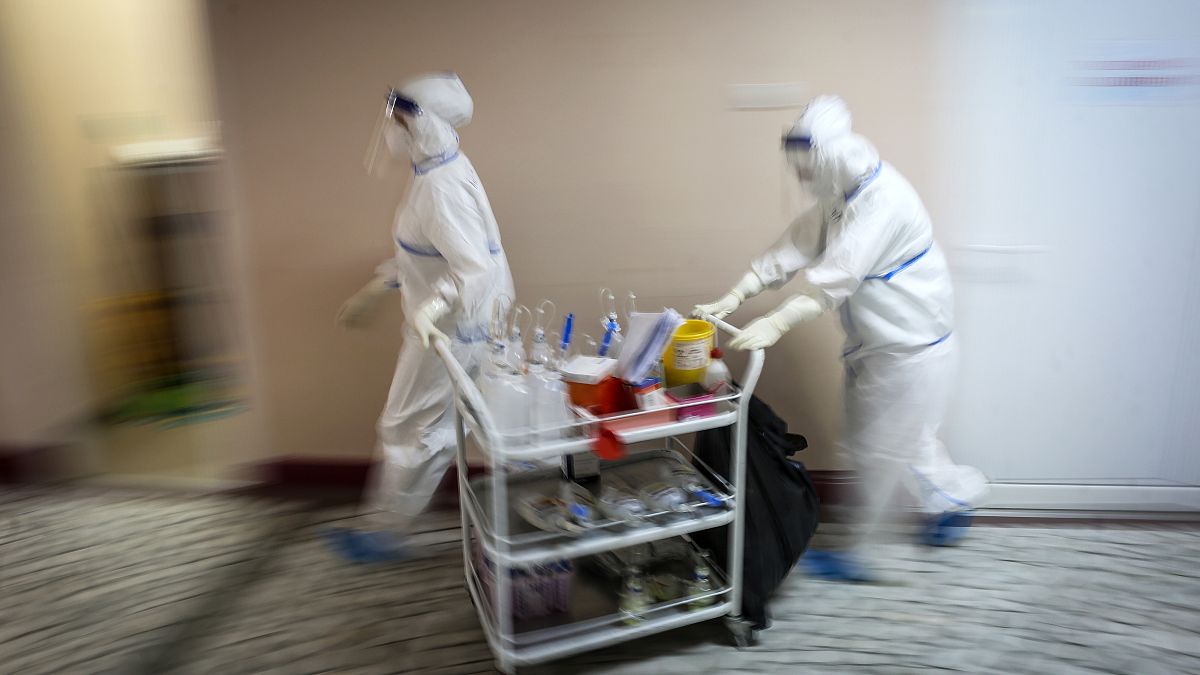The Balkan Investigative Reporting Network (BIRN) found Belgrade underreported COVID-19 deaths by nearly 400 between March 19 and June 1.
Serbia has denied hiding the true impact of COVID-19 in the country in a bid to plough ahead with a parliamentary election.
The Balkan Investigative Reporting Network (BIRN) found Belgrade underreported COVID-19 deaths by nearly 400 between March 19 and June 1.
Milorad Ivanovic, BIRN's editor-in-chief, told Euronews the government officially reported that 244 people died from COVID-19 over this period. But, he claimed, data it had obtained showed there was in fact 632 fatalities.
It is unclear whether there were also discrepancies in the figures during the three weeks up to the June 21 vote. But, immediately after the poll, cases began climbing, going from 91 on election day to 254 just a week later on June 28.
Critics have suggested the lower number of cases before the poll helped encourage Serbians out to vote in the election, which the ruling Serbian Progressive Party (SNS) won by a landslide.
“We came to this situation [a spike in cases] because the decision was made that elections need to be performed," Zoran Radovanović, a professor of epidemiology at the University of Belgrade, told Euronews.
Serbian MP Marinika Tepic, vice president of the opposition Freedom and Justice Party, said the inaccurate data helped the government organise the “fake and dangerous elections”.
“Literally, on the day of the election, the government stated that the health situation is good and, just a day after, they claim that situation is catastrophic and dangerous," she said.
"On top of this hypocrisy, the regime blamed the people for the spread of COVID-19 instead of taking the blame with lifting the measures.”
Serbia went on a strict lockdown on March 15. It eased restrictions at the beginning of May amid public discontent over confinement and despite warnings from doctors it was too early. After a spike in cases after the election, Serbia's president, Aleksandar Vucic, announced a fresh lockdown, which he later backtracked on after protests.
On Wednesday, Serbia's prime minister, Ana Brnabic, denied the government concealed COVID-19 cases but admitted there were errors. She said that these came about during the importing of data into a tracking system.
"In the beginning, we did not have a database," she said. "This was an ad-hoc system.
"We employed some 50 people, via short term contract, to fill in the database in order to avoid burdening our health workers [with the task]. The numbers were not exact and you have the right to criticise."
Rasa Nedeljkov, from Belgrade-based democracy and election watchdog CRTA, said the COVID-19 crisis had lowered trust in Serbia's public institutions.
“Findings of the journalists regarding 'tampered' numbers of [COVID-19] infected/deceased only further downgraded trust in public institutions.
"We should not forget the government's crisis team was giving confusing messages about the virus, that it is weak in the summer, so all of that led to more relaxed behaviour of citizens. All of this makes citizens not trust institutions anymore.
“We have found numerous irregularities regarding the whole election process, not just on voting day. There was abuse of media, illegal use of public offices for campaigns. We have filed complaints to state bodies in charge of these issues, but nothing happens.
“On election day, our observers noted irregularities at some 8 to 10% of voting places monitored. People without ID voted, others even with documents could not vote, there was no check-up [as to whether] a person had already voted."
All this, Nedeljkov said, indicates that votes were “bought” or that people were influenced in some other way.
But Dragan Sormaz, MP for the ruling SNS party, told Euronews there was nothing irregular with the elections and that the vote was not a threat to public health.
“There were elections in Croatia, local elections in France, so what? Nobody complained about those. There were no irregularities. There were observers from OSCE and the NGO sector. The complaints that were made are all hearsay.”
